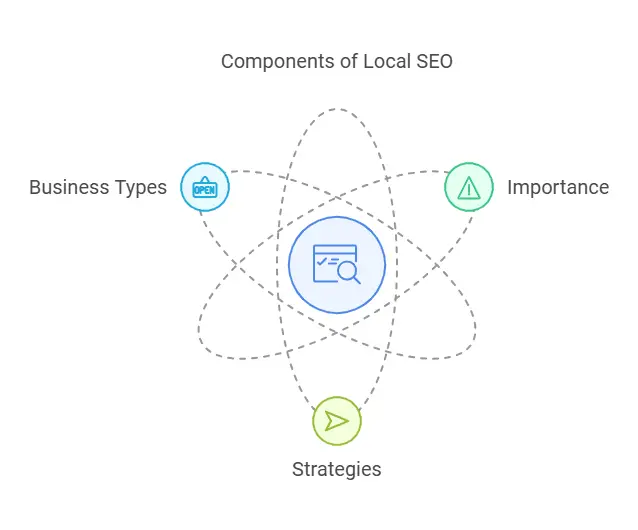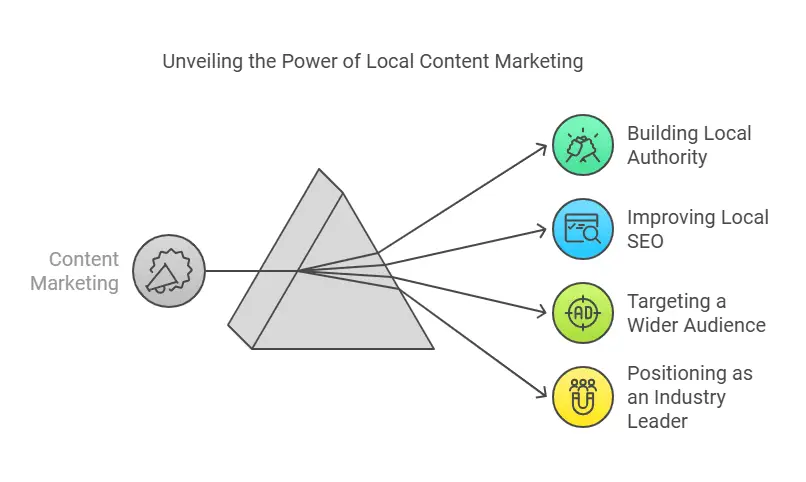Mastering Local SEO: A Comprehensive Guide for Small Businesses
In today's digital world, local SEO is vital for businesses that depend on local customers. A brick-and-mortar store, a service business, or a local e-commerce brand is essential. This article covers local SEO.
It explains its importance and how to use it for your business.


What is local SEO?
Local SEO is optimizing your site to rank higher in local search results. Unlike traditional SEO, which seeks high national rankings, local SEO targets specific areas. It focuses on areas where customers search for products or services.
When people search for nearby businesses, search engines use various factors. These include location, reviews, and situations. They use them to find the most relevant results. Local SEO helps businesses appear in these searches. It makes it easier for customers to find them.
Why does local SEO matter?
We cannot overstate the importance of local SEO. As a recent statistic. Over 46% of all Google searches are seeking local information. Also, 72% of consumers who do a local search visit a store within 5 miles.

- Increased visibility: local SEO helps businesses show up in local search results. It makes it easier for nearby customers to find them.
- Better customer engagement: customers can engage with your business more directly. They can visit your store, call for information, or leave reviews.
- Higher conversion rates: Local searches are often highly targeted. So, they have better conversion rates. Customers searching for nearby businesses want to buy or engage.
Key elements of local SEO
To put in place local SEO, several important elements need to be optimized. They boost your local visibility and help you beat competitors.
1. Google My Business (GMB)
Arguably, the most important tool for local businesses is Google My Business (GMB). This free tool lets businesses manage their Google presence in search and maps. It's vital to optimize your GMB profile to rank well in local searches.
- Claim and verify your business: ensure you have full control over your profile.
- Add photos: High-quality photos increase engagement and showcase your business.
- Collect and respond to reviews: They affect local search rankings.
- Complete your profile: Include all details. This includes your business hours, phone numbers, websites, links, and services.
2. Local keyword optimization
Local keyword search is essential for optimizing your website for local searches. Think of phrases customers might use to find local businesses. For example, "plumber in [city]" or "best pizza near me."
- Include your city or region in page titles, meta descriptions, and headers.
- Use location-based keywords in your content. Do this, especially in blog posts and service pages.
- Optimized for voice searches: Many users perform local searches using voice assistants. Focus on natural language and conversational keywords (e.g., “Where can I find a dentist near me?”)
3. On-page SEO for local searches
On-page SEO is about optimizing web pages. It aims to rank higher and attract more relevant traffic from search engines. For local SEO, this means incorporating location-related elements across your website.
- Add location to title tags and meta descriptions: Use phrases like "best restaurant in [city]." This shows you are targeting a specific location.
- Create location-specific pages: If your business serves many areas, make a page for each region or city.
- Use the schema markup; it helps search engines find your business. It also helps them show relevant info in search results.
4. Citations and local listings
The situation is online, maintaining your business name, address, and phone number (NAP). These situations are crucial for local SEO. They confirm to search engines that your business exists and has a specific location.
- All citations must be consistent; your NAP must match all online directories and social media. So, ensure that all citations are consistent.
- Target high-quality listings. Aim for authoritative, industry-specific directories.
- Submit your business to local directories. These include Yelp, Yellow Pages, and local Chamber of Commerce sites. This will help to build your local authority.
5. Local reviews and ratings
Customer reviews are a powerful ranking factor for local SEO. Positive reviews on Google, Yelp, and Facebook can boost your local search ranking.
- Review strategies encourage satisfied customers to leave reviews. Make it easy by providing links to your review profile and asking for feedback after a purchase.
- Respond to all reviews: Show you care by addressing any concerns.
6. Mobile Optimization
More consumers are using mobile devices to find local businesses. So, your website must be mobile-friendly. Mobile optimization affects user experience and local search rankings.
- Ensure first loading speeds: use tools like Google's page speed test to improve load times.
- Make contact details easy to access: Your phone number and address should be visible and clickable on mobile devices.
Building local authority through content.
Content marketing is a powerful way to build local authority and improve your local SEO. Creating content that is relevant to local interests can target a wider audience. It can also position your business as a thought leader in your industry.

- Write about local events or news: Create blog posts that cover local happenings and link them to your business.
- Use local case studies: share success stories from clients nearby to build credibility.
- Create local guides and resources: Provide helpful community resources. For example, a local business directory or a guide to local services.
The role of social media in local SEO.
Social media can boost your local SEO. It does this by boosting engagement, brand awareness, and site traffic. Local businesses can use Facebook, Instagram, and Twitter to connect with their audience.

- Engage with your community: Respond to comments, share local content, and join local events.
- Promote your GMB profile: Share your Google My Business profile. Encourage customers to leave reviews.
- Use location tags: On Instagram and Facebook, use location tags in your posts. They increase local visibility.
Conclusion: Your Success is Our Goal
Local SEO can help small businesses attract customers in specific areas. Optimize your Google My Business listing. Target local keywords. Get citations and reviews. This will boost your visibility and drive more relevant traffic. To succeed in local search rankings, optimize these elements. Build local content and engage on social media. It will be a long-term success.
If you're a local bakery or plumbing service, use local SEO. It's key to connecting with your community and attracting more customers.

